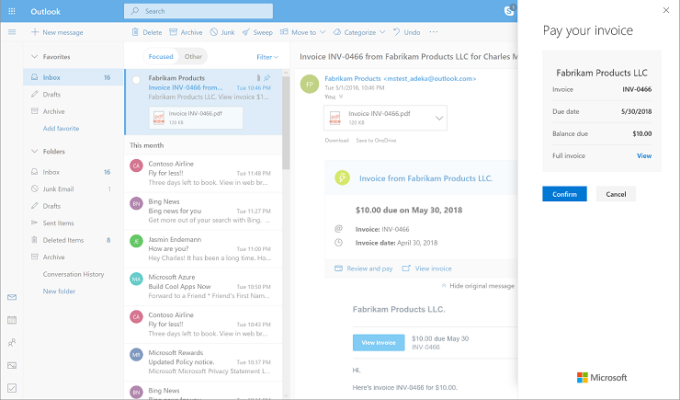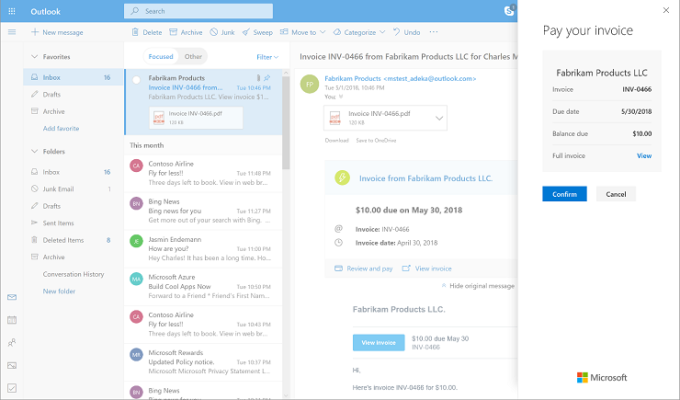
Microsoft Pay — Microsoft’s answer to Android Pay and Apple Pay that was originally launched in 2016 as Microsoft Wallet — is getting a little more useful today. At Build, Microsoft announced that it will be integrating its digital wallet service into Outlook. This means that, for the first time, when a company sends you an invoice in an email, and you are using Outlook to read it, you can pay that bill directly, without needing to leave Outlook and open a different app or service. Instead, a panel that will open to the right of the main one by way of Microsoft’s Adaptive Cards.
As it launches — Microsoft says it will come first to a limited number of Outlook.com users over the next few weeks, and then more broadly over the next few months — it said that Stripe (using Stripe Connect) and Braintree will be among the payment processors powering the service, and Zuora, FreshBooks, Intuit, Invoice2Go, Sage, Wave, and Xero will be among the billing and invoicing services that will initially be using the feature. In other words, businesses using a combination of these will be able to offer Oulook-using customers the ability to use the feature.
The integration of Microsoft Pay into Outlook is part of a bigger shift that Microsoft is making to try to reduce some of the friction in its services by way of Adaptive Cards and other integration-friendly developer mechanics. The company effectively has capabilities covering many different aspects of computing and what the average user might want to do on a screen or in an app, and so it is building (and promoting to developers) more connective bridges to use Microsoft services rather than someone else’s.
Payments in Outlook is a prime example of that: Microsoft is not a bill payment service and is not a bill payment agent — so its partners are the ones making transaction commissions when the invoice is paid there — but offering this convenience to users makes Outlook itself more sticky and more useful overall to people. Down the line, it will help lock users into the Microsoft ecosystem more tightly — just as Android Pay or Apple Pay do the same for those respective platforms. But in that regard, this is also table stakes: conveniences like these have quickly moved from “nice to have” to “why didn’t Outlook have this before?”
For businesses, the sweetener is that they might just get paid that much faster, simply more making the process of paying something easier.
“Stripe’s goal is to increase the GDP of the internet, which we do by providing the tools and infrastructure that make it easier to transact online from anywhere in the world,” said Richard Alfonsi, head of global revenue and growth, Stripe, in a statement. “We’re excited to work closely with Microsoft to power payments in Outlook, allowing anyone receiving an email invoice or bill in Outlook to immediately take action and pay that invoice with a few simple clicks. By removing the friction and time needed to complete a payment, Stripe and Microsoft can help businesses around the world reduce missed or late payments, ultimately increasing their revenue.”
Alongside the Outlook news, Stripe announced that it is also now supporting Microsoft Pay so that businesses that use Stripe in other apps can now offer this as an option to users who are using Microsoft Pay, to avoid inputting card details multiple times. (Stripe already offered support for Apple Pay, Android Pay and Alipay, among others.)
“Our partnership with Stripe opens up new opportunities for developers to monetize on Microsoft platforms” said Peggy Johnson, executive vice president of business development, Microsoft, in a statement. “Starting with payments in Outlook, anyone using Stripe on our platforms can now accept payments with minimal effort, creating a more powerful experience for both our partners and our customers.”


